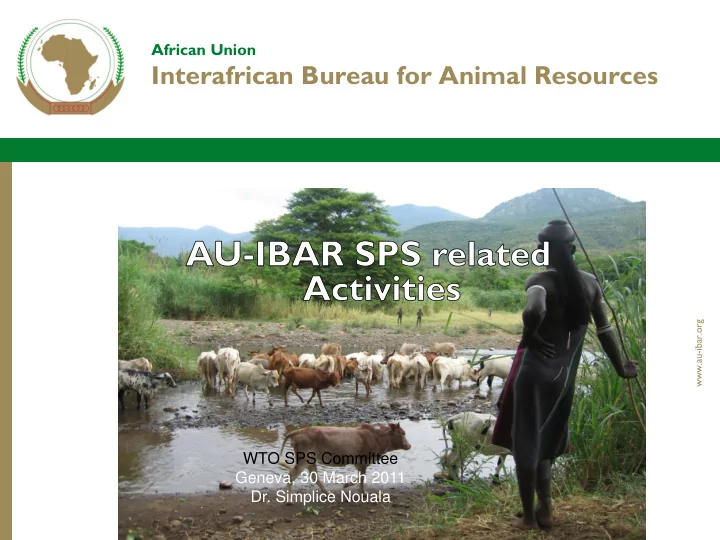

African Union Interafrican Bureau for Animal Resources www.au-ibar.org WTO SPS Committee Geneva, 30 March 2011 Dr. Simplice Nouala
History of AU-IBAR 1951 Interafrican Bureau of Epizootic Diseases (IBED ) aimed at rinderpest eradication 1956 Interafrican Bureau for Animal Health (IBAH) transformed to widen the scope 1965 Part of OAU integrated as a regional technical office 1970 Interafrican Bureau for Animal Resources (IBAR) to reflect the expansion into livestock production issues AU-IBAR has been specialized technical office of the AUC-DREA from 2003
About AU-IBAR For whom? – AU Member States and RECs T o achieve which goal? – T o enhance the contribution of animal resources to economic growth and food and nutrition security and poverty reduction on the continent.
Vision / Mission / Mandate Vision : An Africa in which animal resources contribute significantly to the reduction of poverty and hunger . Mission : T o provide leadership in the development of animal resources for Africa through supporting and empowering AU Member States and Regional Economic Communities Mandate : T o support and coordinate the utilization of animals (livestock, fisheries and wildlife) as a resource for human wellbeing in the Member States, and to contribute to economic development, particularly in rural areas
IBAR Strategic Programs 1. TADs and Zoonosis 2. Natural Resources Management 3. Investment and Competitiveness 4. Standards and Regulations 5. Policies and Capacity Building 6. Knowledge Management
Core functions • Provide technical leadership and advisory services • Facilitate development and harmonisation of policies • Coordination of animal resources development matters • Facilitate articulation of common African positions in global processes • Play advocacy role on issues relevant for Africa • Collate, analyse and disseminate data and information • Provide strategic support to countries in emergency situations
Reinforcing Veterinary Governance in Africa Rationale Animal diseases constraint to livestock development and trade of livestock and livestock products Eradication of animal diseases very expensive and very long process (60 years for the rinderpest and more than 200 million euro invested through IBAR ) The prevention and control of TADs, zoonoses are national and/or global public good Inadequate investments Public and Private Institutional environment not conducive to the provision of affordable, accessible and sustainable quality veterinary services
Reinforcing Veterinary Governance in Africa • 47 ACP countries - 7 RECs (+ non ACP states for common positions issues) • 5 years • Euro 31.2 M: Euro 30M from EU and Euro1.2 M AU • Objective: Improve the institutional environment at national and regional levels to provide effective and efficient animal health services in Africa • 3 levels of intervention: – Advocacy and awareness raising – CB for formulation (policies, strategies, legislations) – CB for implementation
Activities Result 1: Knowledge and awareness for institutional change enhanced Activity 1: Collating and documenting data to support knowledge creation . Activity: 2 Undertake evidence-based advocacy Result 2: Institutional capacity for livestock policy formulation, animal health strategies and legislation enhanced Activity 1: Build capacity for livestock policy and AH strategy formulation Activity 2 Build capacity for the review and development of AH legislation Activity 3 Provide guidance for adopting livestock policy, AH strategies and legislation review and harmonisation.
Activities (Ct’d) Result 3: Institutional capacity for the implementation of policies and enforcement of regulations enhanced Activity1: Enhance capacities for timely collection, analysis and sharing of accurate sanitary information Activity 2: Strengthen disease prevention and control mechanisms at national and regional level Activity3: Facilitate the participation of African countries in AH standard setting processes Activity4: Enhance capacity of RECs and countries to assess the compliance of veterinary services with OIE standards Main expected outcome is to have policies & strategies in place and integrated in national action and investment plans (through CAADP process) PVS and GA are the starting point
Implementation – OIE in charge of quality control on PVS pathway and Capacity building on Vet. Legislation. – FAO in charge of support to policy analysis and strengthening regional networks – AU-IBAR in charge of : • Overall coordination • Support to RECs • Inter regional harmonization • Advocacy and awareness – RECs are both: Beneficiaries and Implementing Partners Cross-cutting issues: – OWOH – PPP
Others AU- IBAR’s SPS related activities Participation of African Nations to Sanitary and Phytosanitary Standard Setting Organizations (PAN- SPSO) • Euro 3.855 M ; 3 years – 47 ACP countries • Objective : Facilitate effective participation of African Countries in the activities of the OIE, IPPC and CAC during the formulation of international SPS standards • Activities/achievements: – Common position of African countries in Standard Setting Process – Capacities of African countries and mechanisms for participation strengthened – SPS related data and information acquired and disseminated (incl. experts database) – Establishment/ strengthen National SPS committee •
Others AU- IBAR’s SPS related activities Establishment of Standard Secretariat • Need to address the three components in more equitable way (animal health, plant health and food safety) • Need to deliver on other aspects (information sharing, capacity building) • Strengthen the capacity of IAPSC on PH standard • Need to coordinate multiple funding sources for SPS activities (Vet Gov , PAN-SPSO, PAN-SPSO II etc)
Establishment of Standard Secretariat. Senior Policy Officer T&M Standards and trade Secretariat coordinator - Coordinate thematic desks activities - Coordination with and support to IAPSC - Admin. & governance PANSPSO1&2, Vet Gov SPS activities, SPS committees, RECs observers status, ToT, WTO SPS issues, bulletin, database Food safety desk Animal Health desk Plant Health Desk CAC standards related OIE standards activities within IAPSC related activities
Thank You AU-IBAR: Providing leadership in the development of animal resources for Africa
Recommend
More recommend